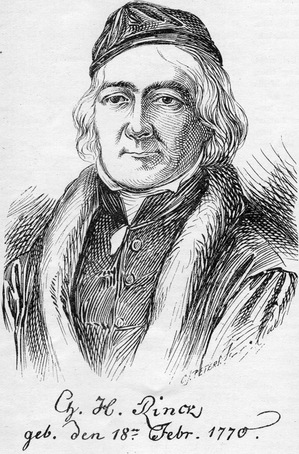 Johann Christian Heinrich Rink was born at Elgersburg, in Saxe-Gotha, February 18, 1770. He studied under Kittel at Erfurt, and thus received excellent training, as Kittel was one of the best pupils of J. S. Bach.
Johann Christian Heinrich Rink was born at Elgersburg, in Saxe-Gotha, February 18, 1770. He studied under Kittel at Erfurt, and thus received excellent training, as Kittel was one of the best pupils of J. S. Bach.
At the age of nineteen Rink was appointed to the position of organist of Giessen, where he also held other appointments. In 1806 he was elected “Professor” at the Darmstadt College, and in 1813 was appointed court organist, and 1817 chamber musician to the Grand Duke, Ludwig I. He made several tours through Germany, and was everywhere received with favor. At Treves he was specially honored, and in 1831 he was elected a member of the Dutch Society for Encouragement of Music. In 1838 he received a cross of the first class from his Grand Duke, and 1840 was made “Doctor of Philosophy and Arts” at the University of Giessen. He died at Darmstadt, August 17, 1846, at the age of 76.
His compositions number about one hundred and twenty-five, including sonatas for the pianoforte, violin, and violoncello: a “Pater Noster” for four voices, with organ-accompaniment, and two motets.
His principal work was the celebrated “Practical Organ-School,” in six parts, with which every organ- student is familiar. This set of etudes is deservedly popular with most organ-teachers, and forms a part of the early training of nearly every prominent organist.



